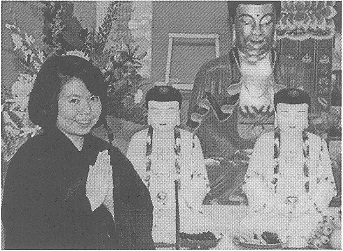|
 有時,我會依適當時機,對人講講我所學到的佛法;得到的反應,好壞都有。師父對於此事有何看法呢?他說:「信佛要靠因緣。如果某人緣份到了,即使你說得不好,他也會信的;但是,如果這人與你無緣,就算你說得再好,他也不會信。而且,人也要有善根才能信!」
(《華嚴經序》卷二,第三門,第105-6頁) 有時,我會依適當時機,對人講講我所學到的佛法;得到的反應,好壞都有。師父對於此事有何看法呢?他說:「信佛要靠因緣。如果某人緣份到了,即使你說得不好,他也會信的;但是,如果這人與你無緣,就算你說得再好,他也不會信。而且,人也要有善根才能信!」
(《華嚴經序》卷二,第三門,第105-6頁)
學佛及研究佛法後,我開始懺悔往昔所造的過失。回想起自己自私、鑽營自利、又放縱自己貪嗔癡的過去;師父曾費盡苦心,流血汗、不休息地教我們遠離迷妄的路途,我定使師父深感失望吧?眼見我就要被昨日之非的悔恨和愧疚浪潮所淹沒了,師父知道我精神上所遭受的壓力和苦楚,就慈悲地安慰我:「那沒什麼,世界上的人都犯那個錯;只要你能改,一切都沒有問題的,我可以為你擔當!」(《宣化上人紀念專集》第二冊第256 頁)
這些話語是他用來安慰一位出家弟子─她因愧疚往昔所犯的錯,而老是低著頭。
拜懺時,我每一拜,都在反省自己過去的不是;我的困擾是:我仍忘不了過去、也無法原諒自己。雖是懺過、也悔過了,有時我依然難斷前愆;也許我還不確定自己是否已然真正懺悔,並且得到原諒了?因此,懺摩留給我的,唯有精神上的壓力,和梳理昨非的無力感。師父又來救我了:「當你要開始重新做人的時候,過去的事一點都不要再去想了;否則你的心裡便會有負擔,好像揹了個沉重的包袱在身上,讓你不能向前面的光明大道邁進。」
他明白我已誠心懺悔,可是仍然陷在懊喪的情緒中,不能自拔;就又開了帖治憂惱的藥方給我:
「懺悔則安樂,是則名為真懺悔。」
研究佛法,真是一件很值得的事。通過經典、《金剛菩提海》雜誌、法要筆記,甚至講經錄音帶,師父總能找到適當的機會來教導我。譬如說:缺乏定力的我,很容易被週遭環境的嘈雜所干擾。有一回,我在忍受妨礙入眠的噪音之餘,乾脆起身翻開經本,猜猜師父說什麼來著?
「菩薩心靜。心裡靜,就是永無煩惱,長保平和。心靜就是快樂。靜並非意謂『我喜歡安靜,你們都要和我一樣的安安靜靜』。不是那樣的,如果你靜得下來,靜就在不靜當中。俗語說:『鬧市中好修行。』你若身處鬧市也能靜,那才是真功夫。你若是跑到一個人影兒也沒有的地方,說你想圖個安靜;一旦真去到某個深山僻林中,結果怎麼樣了?你跟自己吵架啊?呼出一口氣,說: 『唉!你沒安靜!』再吸上一口氣,說:『唉!你沒安靜!』那煩惱就出來了。靜,是指如果你是個會用功的人,那麼處處皆靜;如果你不會用功,那麼就算你要找個安靜的地方,也找不著!」 (《華嚴經》〈十地品〉第 82-3頁)
待續

|
|
Sometimes I will share with others the Buddhadharma that I have learnt, depending on the right circumstances. I will either get a good or hostile response from the other party. What did Shr Fu say regarding this matter? His comment was,
Faith is a matter of causes and conditions. If a person has the appropriate affinities, then even if you didn’t speak well, the person will believe. But if someone has no affinities with you, then no matter how well you speak, they won’t believe. Also, the person needs to have good roots to be able to have faith.” [FAS Prologue 2nd Door III, pgs 105-6]
As I pursue my study and investigation of the Buddhadharma, I become ashamed and repentant of my past wrongdoings. I recollect the times when I’ve been selfish, sought for personal advantage, gave free rein to greed, anger and delusion and so forth. I must have disappointed Shr Fu tremendously after he expended so much effort, sparing neither blood nor sweat to teach us to leave the path of confusion and delusion. I will be immersed in regret and remorse for past mistakes. Shr Fu understands my mental agony and distress, which is a truly painful experience, and he gently and compassionately comforts me in my grief:
That’s nothing. People in the world all make that mistake. As long as you can change, everything’s O.K. I can be responsible for your offenses.” [In Memory of the Venerable Master Hua, Vol.2 pg 256]
He had used those words to console/bring comfort to his left-home disciple who always had her head down in guilt for all the bad things she has done in the past.
When I bow in repentance, with each bow I would reflect on my past wrong deeds. The trouble is that I can neither forget nor forgive myself for past errors. Somehow, I was ‘reluctant’ to let go of my former wrongdoings although I may have repented of them before. Probably I was unsure whether I had really repented and received a pardon. Thus, my repentance sessions leave me mentally exhausted and groggy as I rake up my past wrongdoings. Shr Fu came to my rescue again by saying,
Once you make a fresh start as a new person, don’t think about the past anymore; otherwise your mind will always be burdened, as if you were carrying a heavy bag which prevented you from advancing on the bright journey ahead.
He knew that I was still indulging in remorse although I had repented very sincerely. So he gave me a wonderful panacea which cured me of my misery, “The more you repent, the more joyful you become. This is true repentance.”
Investigating the Buddhadharma is a truly rewarding experience. Through the Sutras,
Vajra Bodhi Sea magazine, Dharma notes, or even his taped lectures, Shr Fu will always find the perfect chance to teach and guide me. For example, I am quite bothered if the environment is too noisy owing to my lack of samadhi power. Once, I was patiently enduring the noise which prevented me from sleeping. I got up and opened my Sutra since I could not sleep. What did Shr Fu talk about?
The Bodhisattva obtains a quiet mind. This quietness is constantly having no afflictions and being at peace. This quiet mind is being happy. Quietness does not mean, ‘I like it quiet. You should all go along with me and be quiet. It’s not that way. It means that right in the middle of a place whose atmosphere is not quiet, you can be quiet, as the saying goes,
The middle of a noisy marketplace
Is good for cultivation.
If you can be quiet in a noisy marketplace, then that’s real gung fu. If you go off someplace where there isn’t a soul, saying that you want peace and quietness, once you’ve run off to some solitary mountain forest, what ends up happening? You quarrel with yourself. You exhale one breath of air and say, ‘Hey, you are not being quiet!’ You inhale the next breath and say, ‘Hey, you are not being quiet!’ and you get afflicted. This quietness means that if you are someone who can apply his skill, then any place will be quiet. If you are someone who is unable to apply his skill, then even if you try to find a quiet place, you won’t be able to.” [FAS Ten Grounds, pgs 82-3]
To be continued
|